
Written By Govind Bhutada
Graphics & Design
- Zack Aboulazm
Published May 8, 2023
•
Updated May 8, 2023
•
The following content is sponsored by CanAlaska Uranium
Uranium: The Fuel for a Utopian Energy Economy
Uranium is the primary fuel for nuclear energy, powering more than 400 reactors that make up 10% of the world’s annual electricity generation.
With countries turning back to nuclear power as a clean energy resource, uranium has become a strategically important metal for the future.
This infographic sponsored by CanAlaska Uranium explores how uranium’s unique properties allow nuclear power to be clean and efficient, and highlights the outlook for its future. This is part 3 of 4 in the Road to Energy Utopia series.
Why Uranium is Unique
Nuclear power ultimately stems from the radioactivity of uranium atoms, which yield great amounts of energy when split by the process of fission.
Besides the radioactive nature of uranium, its energy density—the amount of energy it contains per unit of mass—is one of its exceptional properties, making it significantly more powerful than other energy fuels.
The table below compares the energy density of uranium to other fuels, expressed in megajoules of energy contained per kilogram of fuel:
| Fuel | Type | Energy Density (MJ/kg) |
|---|---|---|
| Firewood | Biomass | 16 |
| Coal | Fossil fuel | 24 |
| Crude Oil | Fossil fuel | 44 |
| Diesel | Fossil fuel | 45 |
| Gasoline | Fossil fuel | 46 |
| Liquefied Natural Gas | Fossil fuel | 55 |
| Uranium-235 (enriched to 3.5%) | Nuclear fuel | 3,900,000 |
Enriched uranium-235, the fuel used by commercial nuclear reactors, contains 3.9 million megajoules of energy per kilogram of weight, which is magnitudes larger than the energy density of traditional fossil fuels.
For this reason, a relatively small quantity of nuclear fuel can produce significant amounts of energy through fission, translating into various advantages for nuclear power:
- High Energy Return on Investment (EROI)Nuclear power has the highest EROI of any energy source, returning 75 units of energy for every unit of energy spent in construction and operation.
- Low Land FootprintNuclear power plants have the smallest land footprint per unit of electricity at 0.3m2 per megawatt-hour.
- Minimal WasteNuclear reactors produce little waste or spent fuel, and only a small portion of that is highly radioactive. Spent fuel can also be recycled.
Powering a Clean Energy Future with Uranium
The outlook for uranium has turned brighter with countries again embracing nuclear energy.
In 2021, global uranium requirements from reactors totaled 62,496 tonnes. By 2040, that figure could rise from 79,400 tonnes in the lower case to 156,500 tonnes in the upper case according to the World Nuclear Association, depending on how the conditions and policies for nuclear power shape up.
In 2021, mines provided about 77% of the uranium required for reactors, with 23% coming from secondary sources like stockpiles held by utilities and governments. Although maintaining these stockpiles is important for energy security, a sustainable mine supply of uranium will always be key to meeting rising reactor requirements.
In part 4 of the Road to Energy Utopia series, we explore how the metals copper and nickel are essential to the energy transition.
Learn more about CanAlaska, the leading exploration company in the Athabasca region.

Please enable JavaScript in your browser to complete this form.Subscribe to our free newsletter and get your mind blown on a daily basis: *Sign up
Related Topics: #energy density
Click for Comments
var disqus_shortname = "visualcapitalist.disqus.com";
var disqus_title = "Uranium: The Fuel for a Utopian Energy Economy";
var disqus_url = "https://www.visualcapitalist.com/sp/uranium-the-fuel-for-a-utopian-energy-economy/";
var disqus_identifier = "visualcapitalist.disqus.com-157752";
You may also like
-
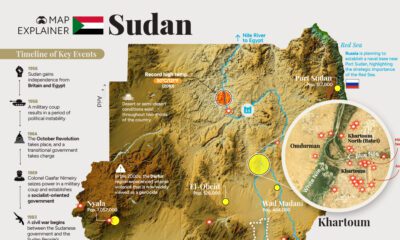
Africa15 hours ago
Map Explainer: Sudan
This comprehensive map explainer covers both key facts about Sudan, as well as information on the violent power struggle unfolding there
-
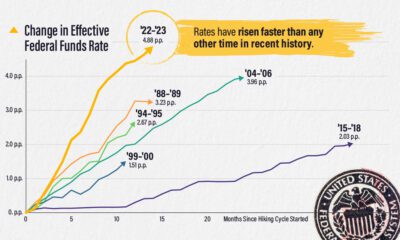
Money23 hours ago
Comparing the Speed of Interest Rate Hikes (1988-2023)
The effective federal funds rate has risen nearly five percentage points in 14 months, the fastest interest rate hikes in modern history.
-
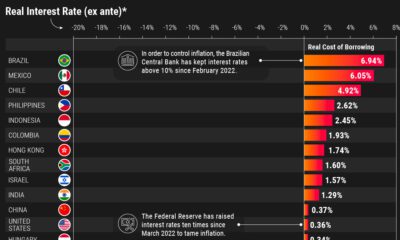
Markets4 days ago
Visualized: Real Interest Rates by Country
What countries have the highest real interest rates? We look at 40 economies to analyze nominal and real rates after projected inflation.
-
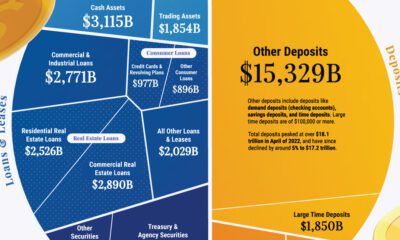
Money6 days ago
Visualizing the Assets and Liabilities of U.S. Banks
Banks play a crucial role in the U.S. economy, and understanding their balance sheets can offer insight into why they sometimes fail.
-
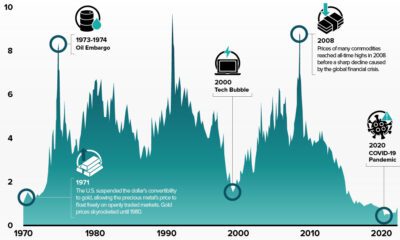
Commodities7 days ago
Charted: Commodities vs Equity Valuations (1970–2023)
The commodities-to-equities ratio recently hit a 50-year low. In the past, when this ratio reached such levels, commodity supercycles began.
-

Healthcare1 week ago
Ranked: The Best U.S. States for Retirement
Getting ready for retirement? See which states score the highest in terms of affordability, quality of life, and health care.
Subscribe
Please enable JavaScript in your browser to complete this form.Join the 380,000+ subscribers who receive our daily email *Sign Up
The post Uranium: The Fuel for a Utopian Energy Economy appeared first on Visual Capitalist.